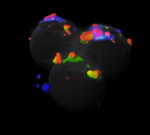Professor Eric Morand Lupus Research Grant Interview

Professor Eric Morand Lupus Research Grant Interview
Improved outcomes for patients with lupus are expected as a result of nearly $750,000 in funding secured by researchers at Monash University.
Pharmaceutical companies UCB Biopharma SPRL and GlaxoSmithKline (GSK), who are among the leading companies worldwide developing therapies for lupus, are to fund research led by Professor Eric Morand, Head of the School of Clinical Sciences based at Monash Health, to develop new ways to measure treatment outcomes in lupus.
'Systemic lupus erythematosus (SLE, or lupus) is a serious multisystem autoimmune disease," said Professor Morand.
'Patients with lupus, usually young women, can suffer severe illness and in some cases a loss of life expectancy due to the immune system damaging multiple organs.
'The most severe symptoms of lupus involve the kidneys, heart, and central nervous system."
Due to its complexity, there is currently no agreed, evidence-based definition of a treatment outcome measure for lupus. This has resulted in inconsistent use of medicines and uncertainty about the role of novel therapies.
'Thanks to the support of UCB and GSK, this research will validate a new outcome measure in lupus that can be used in trials and in practice," said Professor Morand.
In a study by the Asia Pacific Lupus Collaboration (APLC), led by Monash University, the investigators have devised a new way to simply measure responses to treatment in lupus. The new funding will support the APLC validation of this method.
Head of the Monash Lupus Clinic, Dr Alberta Hoi said funding of the project would enable the researchers to drive optimal use of therapies and create evidence-based clinical guidelines in lupus for the first time.
'This study has the potential to have ground-breaking impact in clinical research and clinical care in lupus," Dr Hoi said.
Founded in 2006, the Monash Lupus Clinic at Monash Health is the largest lupus-specific clinic in Australia, providing care by a multidisciplinary team of specialists. Lupus research at Monash University covers the range from laboratory discovery to clinical trials.
Interview with Professor Eric Morand
Question: What will the $750,000 in funding secured by researchers at Monash University mean for those with Lupus?
Professor Eric Morand: The specific research being funded will validate a new way to described disease status in Lupus, assisting in determining which patients are responding to theray and potentially being used in trials to compare therapies. As lupus is a complex disease this has not been previously attempted. Once complete, the results will mean that patients can ask their doctors if they have reached a low disease activity target state, and also know if the treatment that they are on has been proven to deliver such an outcome.
Question: What are the latest treatment options for Lupus?
Professor Eric Morand: The specific research being funded will validate a new way to described disease status in Lupus, assisting in determining which patients are responding to theray and potentially being used in trials to compare therapies. As lupus is a complex disease this has not been previously attempted. Once complete, the results will mean that patients can ask their doctors if they have reached a low disease activity target state, and also know if the treatment that they are on has been proven to deliver such an outcome.
Question: How does lifestyle including diet help those with Lupus?
Professor Eric Morand: Sun avoidance is important to avoid skin rashes, but as a result exercise and vitamin D can suffer, so patients need to find alternative ways to supplement vitamin D and get plenty of exercise.
Question: What dietary supplements would help Lupus patients in particular?
Professor Eric Morand: There is no evidence that anything other than a general healthy diet is needed for lupus patients.
Question: What are the symptoms associated with Lupus?
Professor Eric Morand: http://www.med.monash.edu.au/scs/diseases/lupus/
Question: What is the cause of Lupus?
Professor Eric Morand: Although still not known in full, we know there are genes that increase the risk of lupus as well as non-inherited factors. In the end the immune system malfunctions and becomes activated against its owner, instead of only against germs - this is called autoimmunity. A vaccine would give you antibodies against the flu - which is good - but in lupus you have antibodies against yourself - which is not.
Question: Although there is currently no cure for Lupus; what do you recommend for patients regarding quality of life?
Professor Eric Morand: Keeping a positive attitude is key. Most patients do have a good life, including working, having a family, etc, even though they have to take medications to achieve this. Tiredness is common and keeping a high level of fitness is the best defence against this. Above all, having a correct diagnosis and correct treatment is essential to get the best outcomes.
Question: How useful do you find drugs such as Plaquenil, Prednislone, Imuran?
Professor Eric Morand: These are very helpful medicines that we use a lot, and many paitents have great results from these drugs.
Plaquenil is generally recommended to be taken by everyone with lupus, as it reduces flares without suppressing immunity.
Prednisolone is a steroid and while effective it has a lot of long term side effects. All our laboratory efforts in lupus research at Monash are aimed at finding a way to get the benefits of steroids without these side effects - but we are a few years away still/.
Imuran and similar medicines like Cellcept and Myfortic are important in the treatment of severe lupus.
Together these drugs work well for most people but steroid side effects, and cases where these drugs don't work, are the main areas of concern.
Question: Is your study looking into the side effects used for the treatment of Lupus?
Professor Eric Morand: No.
Question: What are the best ways to boost immune system during a Lupus flare up?
Professor Eric Morand: Actually that is the opposite of what we want to do. Lupus is caused by an over-active immune system, so boosting it is quite the wrong idea.
Question: And, when the Lupus is active how long, on average, does it take for a patient to improve?
Interview by Brooke Hunter
Have You Seen This?
MORE









